Being a Pioneer Goes Beyond Pulling a Handcart, Leader Says
Contributed By Marianne Holman Prescott, Church News staff writer
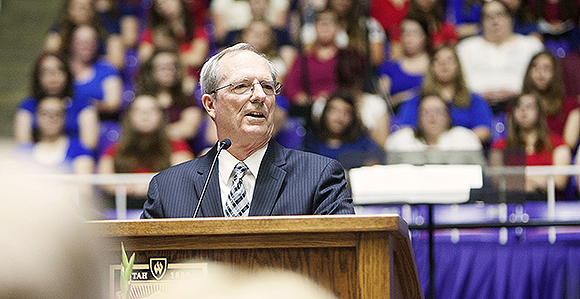
Brother Tad R. Callister, Sunday School General President, addresses a congregation at the Dee Events Center in Ogden, Utah, Sunday, July 17.
Article Highlights
- A pioneer is someone with faith, courage, and a willingness to do what is right despite personal sacrifice or cost.
- Pioneer: the first member of a family to join the Church or anyone who leads out in a righteous cause.
- We can honor the pioneers by living righteously.
“A pioneer is defined as someone who leads the way.” —Tad R. Callister, Sunday School General President
“We honor our pioneer ancestors by the lives we live,” said Brother Tad R. Callister, Sunday School General President, during the annual Ogden Pioneer Days devotional held in the Dee Events Center on the Weber State University campus on July 17.
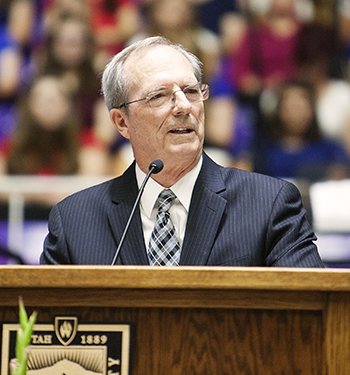
Brother Tad R. Callister addresses a congregation at the Dee Events Center in Ogden, Sunday, July 17. Photo by Hans Koepsell, Deseret News.
“A pioneer is defined as someone who leads the way,” Brother Callister said. “We often focus on pioneers who came to the Salt Lake Valley and surrounding communities, and rightfully so, because this is our homeland, and their pioneering efforts have led the way for us.”
But being a pioneer goes beyond pulling a handcart to Utah, Brother Callister taught.
Without minimizing the heroic efforts of the early Utah pioneers, Brother Callister recognized that all pioneers—both domestic and international—had certain “common ingredients.” Those ingredients—faith, courage, and a willingness to do what is right despite personal sacrifice or cost—create a legacy for all to learn from today.
Brother Callister shared stories of sacrifice and conversion from the lives of five “pioneers” from around the world.
Brother Callister told of Anna Widtsoe, a 29-year-old woman living in Norway in 1878. When her husband, John, unexpectedly died, she was left with little hope and two children to care for. In an effort to “start a new life” she moved with her children to a new city. There she met a shoe cobbler who promised her he could give her “something of more value than soles for your child’s shoes.”
The cobbler was a member of the Church who shared with the widow the plan of salvation and how to find happiness in this life while preparing for eternal joy in the life to come. Although the young mother hesitated at first—she had heard of Mormons and didn’t want to associate with them—it was through learning about the gospel that she was able to find joy in a greater purpose and plan.
Brother Callister then spoke of a couple living on the Pacific island of Kiribati, who found the gospel of Jesus Christ while attending a Church school on another island. Their deep desire to learn both of spiritual and secular things helped them become pioneers in the gospel as they helped to establish the Church on a small island.
Speaking of people he met while on assignment in his former Church calling as a General Authority Seventy, Brother Callister spoke of the people living in Papua New Guinea. He told of the sacrifice of the members as they traveled by canoe to attend their meetings. Amid personal hardship and physical ailments the members were faithful.
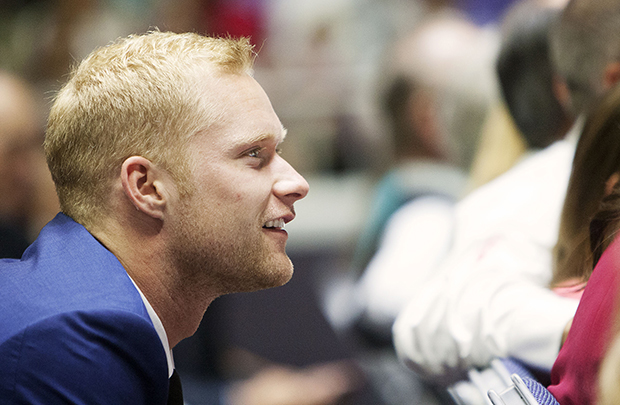
An audience member smiles during Brother Tad R. Callister's address at the Dee Events Center in Ogden, Sunday, July 17. Photo by Hans Koepsell, Deseret News.
“In my mind, all of these were pioneers—just as much as those who crossed the plains in the handcarts or covered wagons,” Brother Callister said. “In a sense, everyone who is the first member of his or her family to join the Church or lead out in a righteous cause is a pioneer.”
The last example he told was of Mary Goble Pay, a local pioneer who at age 13 traveled with her family in the John A. Hunt wagon company, which followed close behind the Martin handcart company in 1856. While traveling, Mary experienced intense cold and hunger and later had her toes amputated.
Later in her life, while living in the Salt Lake Valley, she married a widower from her wagon company. In 1893 her husband suddenly became ill and died, leaving Mary to raise their 13 children. Bitter from her trials and hardship, she stopped going to church. Then one evening her husband came to her in a vision and told her it was the Lord’s will that he had been taken. That experience softened her heart and she returned to full activity in church.
“These pioneers and many others throughout the world paid a tremendous price, physically and spiritually, so that we could have the gospel in our lives,” said Brother Callister.
It is through living righteous lives that a person is able to honor the pioneers, he continued. “No doubt this is the greatest tribute we can pay to those who paved the way with faith and courage. As has been said before, words are inadequate to honor great deeds; great deeds can only be honored by great deeds.”
During his remarks, Ogden City Mayor Mike Caldwell reminded community members that amid hardship, tragedy, and chaos, there is still a lot of good in the world today. He recognized the “true pioneer spirit” he has seen as people in the community serve others, recognizing that together they are “something larger than ourselves.”
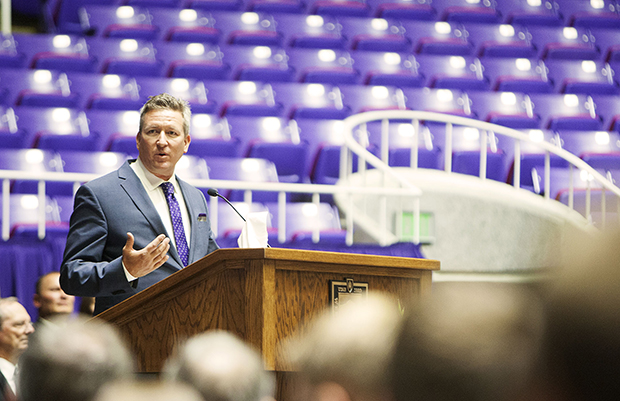
The mayor of Ogden City, Mike Caldwell, speaks at the Ogden Pioneer Days devotional at the Dee Events Center in Ogden, Sunday, July 17. Photo by Hans Koepsell, Deseret News.
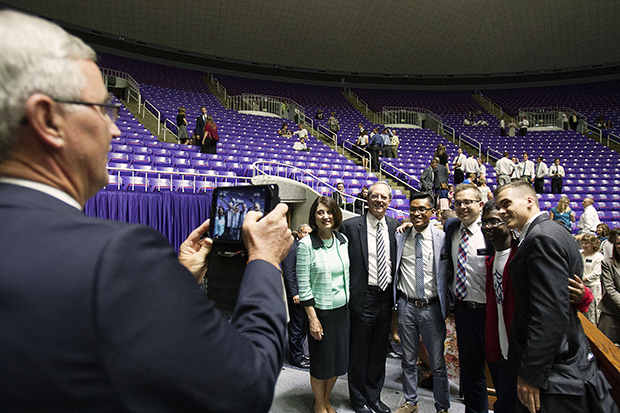
Missionaries and others get their picture taken with Brother Tad Callister and his wife, Sister Kathryn Callister, at the Dee Events Center in Ogden, Sunday, July 17. Photo by Hans Koepsell, Deseret News.
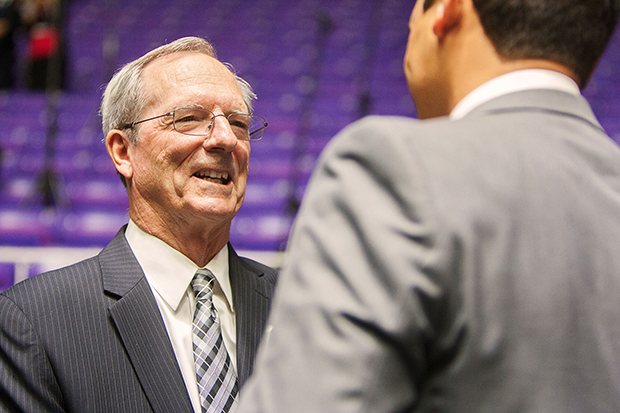
Brother Callister greets a missionary after the devotional at the Dee Events Center in Ogden, Sunday, July 17. Photo by Hans Koepsell, Deseret News.
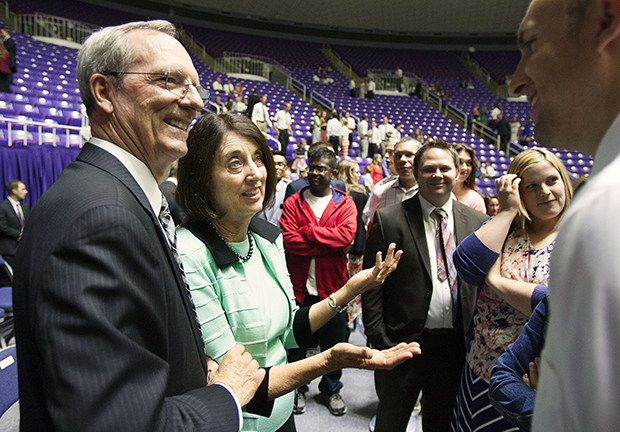
Brother Tad Callister and his wife, Sister Kathryn Callister, talk with audience members at the Dee Events Center in Ogden, Sunday, July 17. Photo by Hans Koepsell, Deseret News.
